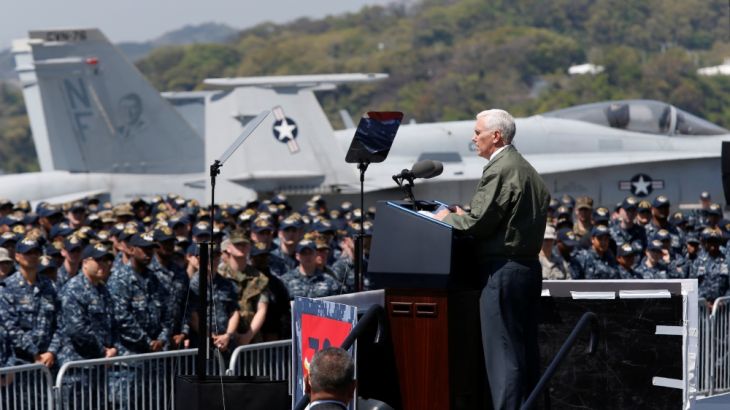Mike Pence fires a fresh warning to North Korea
Visiting Japan as part of trip to reassure allies, US vice president promises ‘overwhelming and effective response’.

The US will counter any North Korean attack with an “overwhelming and effective” response, Vice President Mike Pence has said.
He sounded the warning on Wednesday from the deck of the aircraft carrier USS Ronald Reagan, docked in Yokosuka, Japan.
Keep reading
list of 4 itemsUS House approves aid package worth billions for Ukraine, Israel
Will India’s election be free and fair?
Togo approves constitutional reform changing how president is elected
Pence is in the region to reassure US allies unnerved by North Korea’s ongoing missile programme, and its apparent readiness to carry out another banned nuclear test in its quest to develop an atomic weapon that can hit the US mainland.
Pence, whose Asia visit started in South Korea on Sunday, just hours after the reportedly failed launch by North Korea of what analysts said could have been a new missile, said the threat from North Korea was growing.
OPINION: Will China intervene in North Korea?
“North Korea is the most dangerous and urgent threat to peace and security in the Asia-Pacific,” he told the audience of American and Japanese military personnel.
He pledged to “defeat any attack and meet any use of conventional or nuclear weapons with an overwhelming and effective American response”.
Pence’s comments come after a warning by a senior North Korean official that his government plans weekly tests and an “all-out war” if the US takes any action against it, and has no intention of going slow on its missile programme.
|
|
In an exclusive interview with Al Jazeera on Monday, Sin Hong-chol, North Korea’s deputy foreign minister, said: “The time of dictating orders by brandishing the US military might has gone.
“If those businessmen in power in the US thought of intimidating us by any military or sanction threats – as the [Barack] Obama administration used to do and failed – they will soon find out such threats are useless.
“If we notice any sign of assault on our sovereignty, our army will launch merciless military strikes against the US aggressors, wherever they may exist, from the remote US lands to the American military bases on the Korean Peninsula, such as those of Japan and elsewhere.”
That kind of rhetoric has unnerved allies in Japan and South Korea. Seoul, the South Korean capital, is within easy range of North Korean long-range artillery.
Al Jazeera’s Wayne Hay, reporting from Tokyo, said North Korea is dominating Pence’s visit in Japan, although he is also holding economic and trade talks with Japanese officials.
“I think this is really part of an assurance campaign from Mike Pence,” he said, “because there was a lot of concern – not just in Japan but around the Asia-Pacific region – when Donald Trump won the election in the United States that his ‘America First’ policy would undo a lot of the work done by his predecessor Barack Obama and his ‘pivot to Asia’.
“This visit is really about giving some assurances to governments and also to those in the business world, that the United States is not going to turn its back on this region, it’s not going to turn its back on Japan – either economically or militarily.”
Aircraft carrier confusion
The diplomatic developments come amid much confusion surrounding the path of the USS Carl Vinson.
The US navy has said another aircraft carrier intended as a show of force to North Korea will arrive in the Sea of Japan next week.
The navy had said on April 8 that it was directing a naval strike group headed by the Vinson to “sail north” as a “prudent measure” to deter North Korea.
|
|
And on April 11, Jim Mattis, the Pentagon chief, said the Vinson was “on her way up” to the peninsula.
The next day President Donald Trump said: “We are sending an armada. Very powerful.”
But at the time of the announcements, the ships had temporarily headed in the opposite direction, to the Indian Ocean, for military exercises with Australia.
Al Jazeera’s Craig Leeson, reporting from Seoul on Wednesday, said the fleet was thousands of miles away from the Korean Peninsula during North Korea’s recent missile test and is still several days’ travel from there.
“It certainly brings into question the US bluff about its ability to strike North Korea at that particular time, and I am sure its allies are wondering now about the credibility of the US saying that it has South Korea’s back 100 percent,” he said.
In his remarks in Japan on Wednesday, Pence also issued a warning to China regarding the South China Sea, where it has built reefs and islets into fortified islands capable of hosting military assets to bolster its claim to sovereignty over the sea.
“Our treaty [with Japan] covers all the territory administered by Japan, including the Senkaku Islands,” he said, referring to an archipelago in the East China Sea that is controlled by Japan but claimed by China.
Freedom of navigation
Pence said the US would defend the right to freedom of navigation through the waterway, one of the most important shipping channels on the planet.
He also said more of the US’ most advanced military assets would be deployed to the Asia-Pacific.
Approximately 47,000 US troops are stationed in Japan and a further 28,000 in South Korea.
|
|